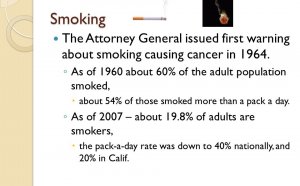
Cancer from cigarettes
An estimated 2.6 million people now use e-cigarettes in the UK. And this rapid rise in popularity – along with the huge range of products on sale – has meant that research on the devices has struggled to keep up.
It’s no surprise then that e-cigarettes have become a bit of a contentious public health issue, with vapers, scientists and the media all debating the potential positive or negative consequences of their use.
But the only way to settle this debate – and to realise their potential – is through research.
Long-term, high-quality studies are crucial to provide reliable evidence about these products’ effects on our behaviour, physiology and health, and allow us to continue to provide evidence-based recommendations to policy makers.
And since policy makers in the UK are already facing legislative decisions around e-cigarettes, the planning about what research to do has to happen now.
With so much to gain if e-cigarettes are proven to help people ditch tobacco, we’re making research on e-cigarettes a key priority.
So let’s take a look at the research we’re already funding, and how we’re working with the research community to identify new questions to answer.
What we’re already funding
It’s important to point out that we already fund research on e-cigarettes. In fact, we’ve recently increased our budget for e-cigarette research, with an additional £5 million via both our Tobacco Advisory Group, and our Population Research Committee.
This means we’ve been able to fund an extra 12 research projects. This includes exciting new research on how young adults understand and experience the devices; their impact in people with mental illness; and a long-term study looking at ‘real-world’ examples of how e-cigarettes may help people quit smoking.
These projects will help answer some of the burning questions on e-cigarettes.
But what else do we need to know?
To find out, we held two workshops earlier this year in collaboration with the British Lung Foundation (BLF), British Heart Foundation (BHF), the Department of Health, the Economic and Social Research Council (ESRC), the Medical Research Council (MRC) and the Wellcome Trust..
What should we be funding?
The workshops were themed around research that would look at how e-cigarettes work, and what happens when people use the devices. And we brought together scientists, health professionals, policy-makers and representatives from the vaping community to discuss the key research questions.
The workshops were aimed at understanding what we already know, and identifying the key research gaps in this area. And a number of key priority areas for future research were raised for further consideration:
- Drivers: What are the external factors that affect people’s behaviour and perceptions of e-cigarettes (e.g., marketing, regulation, public health messaging etc.)?
- Perceptions: What are the psychological factors (e.g., attitudes, beliefs, etc.) that influence how people use e-cigarettes (e.g., intermittent, regular, dual, non-use)?
- Behaviours: What are the patterns of e-cigarette and tobacco cigarette use in the UK? And, crucially, how effective are e-cigarettes for quitting smoking?
- Mechanisms: What are the biological effects of nicotine and constituents of vapour in e-cigarettes? How does this vary between vapers and devices (e.g. puff duration, voltage, particle size and density etc)?
- Outcomes: What are the longer-term health effects from using e-cigarettes? (e.g., in pregnancy, quit rates, relapse rates etc. and can we use early biomarkers or existing cohort studies). And what are the potential consequences for vulnerable populations? (e.g., pregnant, adolescents, mental health, etc.)
We’ll also be working with the workshop partners and other funders, including the British Lung Foundation (BLF) and the Wellcome Trust, to promote our existing funding streams to e-cigarette researchers.
Working together
As well as the workshop, we’ve also been working with Public Health England on the new UK Electronic Cigarette Research Forum (UKECRF), which has established a network of researchers, policy makers and practitioners to discuss research relating to electronic cigarettes and how this relates to policy.
VIDEO REVIEWS



Share this Post
Related posts
Lung cancer from smoking
The Abramson Cancer Center of the University of Pennsylvania Last Modified: May 8, 2013 Question Does stopping smoking and/or…
Read MoreSmoking causing cancer
Yes. Among the more than 7, chemicals that have been identified in secondhand tobacco smoke, at least 250 are known to be…
Read More










